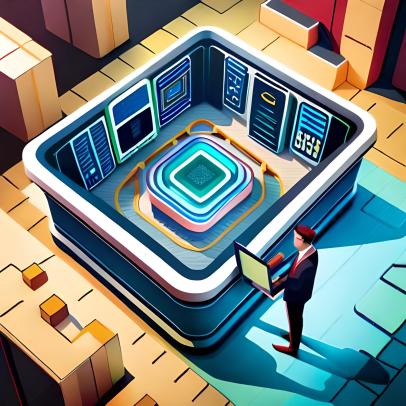Introduction
In the ever-changing world of cybersecurity, selecting the appropriate laptop is critical. With the continuous escalation of cyber threats, experts in this industry want a powerful and dependable ally to keep up with criminal actors. This post is intended to help cybersecurity enthusiasts and professionals choose the finest laptop to fit their unique demands and provide optimal safety while navigating the digital environment.
Understanding the Requirements for a CyberSecurity Laptop

To effectively tackle the challenges in the cybersecurity landscape, it is crucial to identify the essential features and specifications that a laptop should possess:
- Powerful Processor for Handling Intensive Tasks: A cutting-edge processor enables the swift execution of complex algorithms and ensures smooth performance, particularly while running resource-intensive tools and simulations.
- Sufficient RAM for Multitasking: Multitasking is a standard practice in cybersecurity, making ample Random Access Memory (RAM) a necessity. Sizable RAM allows for seamless switching between multiple virtual machines, analyzing vast datasets, and orchestrating different security tools simultaneously.
- Security-Focused Operating System: Opting for a laptop with a security-focused operating system provides an added layer of protection against various cyber threats. Certain operating systems prioritize security by design, actively combating vulnerabilities and offering secure environments for cybersecurity professionals.
- Extensive Storage Options: Cybersecurity professionals often deal with large datasets and require significant storage capacity. Choosing a laptop with extensive storage options, like solid-state drives (SSDs) or hybrid storage solutions, ensures smooth data handling and accessibility.
- Robust Connectivity: A laptop that offers reliable and diverse connectivity options, including Ethernet, Wi-Fi, Bluetooth, and USB ports, facilitates seamless integration with various networks and peripheral devices.
- Reliable Battery Life: For professionals who frequently work on the go or during power outages, a laptop with long-lasting battery life is crucial. Ensuring the battery can sustain extended usage without requiring frequent recharging enhances productivity and reduces the risk of disruption.
Exploring Top Laptops for Cybersecurity Professionals

1. Acer Aspire 5 – Starting at PKR 85,999
- Processor: Intel Core i5-1135G7
- Memory: 8GB RAM
- Storage: 256GB SSD
- Display: 15.6-inch Full HD display
- Battery life: Up to 10 hours
- Pros: Affordable, lightweight and portable, long battery life, variety of configuration options
- Cons: Not as powerful as some other laptops on this list, build quality could be better
2. HP Pavilion 15 – Starting at PKR 79,999
- Processor: AMD Ryzen 5 5500U
- Memory: 8GB RAM
- Storage: 512GB SSD
- Display: 15.6-inch Full HD display
- Battery life: Up to 10 hours
- Pros: Affordable, powerful performance, long battery life, comfortable keyboard
- Cons: Not as well-built as some other laptops on this list, display could be better
3. Lenovo IdeaPad 3 – Starting at PKR 64,999
- Processor: AMD Ryzen 3 5300U
- Memory: 8GB RAM
- Storage: 256GB SSD
- Display: 15.6-inch Full HD display
- Battery life: Up to 7 hours
- Pros: Affordable, lightweight and portable, long battery life, variety of configuration options
- Cons: Not as powerful as some other laptops on this list, build quality could be better
4. Dell Inspiron 15 3511 – Starting at PKR 72,999
- Processor: Intel Core i5-1135G7
- Memory: 8GB RAM
- Storage: 512GB SSD
- Display: 15.6-inch Full HD display
- Battery life: Up to 7 hours
- Pros: Affordable, powerful performance, long battery life, variety of configuration options
- Cons: Not as well-built as some other laptops on this list, display could be better
5. ASUS VivoBook 15 – Starting at PKR 74,999
- Processor: AMD Ryzen 5 5500U
- Memory: 8GB RAM
- Storage: 512GB SSD
- Display: 15.6-inch Full HD display
- Battery life: Up to 8 hours
- Pros: Affordable, powerful performance, long battery life, stylish design
- Cons: Not as well-built as some other laptops on this list, display could be better
6. MSI Modern 14 – Starting at PKR 97,999
- Processor: Intel Core i5-1135G7
- Memory: 8GB RAM
- Storage: 512GB SSD
- Display: 14-inch Full HD display
- Battery life: Up to 10 hours
- Pros: Powerful performance, long battery life, lightweight and portable, variety of security features
- Cons: Expensive, not as well-built as some other laptops on this list
7. Huawei MateBook D 15 – Starting at PKR 99,999
- Processor: Intel Core i5-1135G7
- Memory: 8GB RAM
- Storage: 512GB SSD
- Display: 15.6-inch Full HD display
- Battery life: Up to 11 hours
- Pros: Powerful performance, long battery life, lightweight and portable, unique design
- Cons: Expensive, not as well-built as some other laptops on this list, limited availability in Pakistan
8. Lenovo ThinkBook 14s Yoga – Starting at PKR 109,999
- Processor: Intel Core i5-1135G7
- Memory: 8GB RAM
- Storage:512GB SSD
- Display: 14-inch Full HD (1920 x 1080) IPS touchscreen display
- Battery life: Up to 10 hours
- Price (PKR): 109,999
- Pros: Powerful performance, Long battery life,2-in-1 design, Security features, Affordable price
- Cons: No dedicated graphics card,Build quality could be better,The display could be brighter
9. HP Envy 13 – Starting at PKR 114,999
- Processor: Intel Core i5-1135G7
- Memory: 8GB RAM
- Storage: 512GB SSD
- Display: 13.3-inch Full HD display
- Battery life: Up to 10 hours
- Pros: Powerful performance, long battery life, lightweight and portable, stylish design
- Cons: Expensive, not as well-built as some other laptops on this list
10. Dell XPS 13 (9310) – Starting at PKR 124,999
- Processor: Intel Core i5-1135G7
- Memory: 8GB RAM
- Storage: 512GB SSD
- Display: 13.3-inch InfinityEdge display with touch or non-touch option
- Battery life: Up to 11 hours
- Pros: Powerful performance, long battery life, lightweight and portable, beautiful display, variety of configuration options
- Cons: Expensive, no SD card reader, some users have reported build quality issues
Here is a table summarizing the specifications of all 10 laptops:
| Laptop | Processor | Memory | Storage | Display | Battery life | Price (PKR) |
|---|---|---|---|---|---|---|
| Acer Aspire 5 | Intel Core i5-1135G7 | 8GB RAM | 256GB SSD | 15.6-inch Full HD display | Up to 10 hours | 85,999 |
| HP Pavilion 15 | AMD Ryzen 5 5500U | 8GB RAM | 512GB SSD | 15.6-inch Full HD display | Up to 10 hours | 79,999 |
| Lenovo IdeaPad 3 | AMD Ryzen 3 5300U | 8GB RAM | 256GB SSD | 15.6-inch Full HD display | Up to 7 hours | 64,999 |
| Dell Inspiron 15 3511 | Intel Core i5-1135G7 | 8GB RAM | 512GB SSD | 15.6-inch Full HD display | Up to 7 hours | 72,999 |
| ASUS VivoBook 15 | AMD Ryzen 5 5500U | 8GB RAM | 512GB SSD | 15.6-inch Full HD display | Up to 8 hours | 74,999 |
| MSI Modern 14 | Intel Core i5-1135G7 | 8GB RAM | 512GB SSD | 14-inch Full HD display | Up to 10 hours | 97,999 |
| Huawei MateBook D 15 | Intel Core i5-1135G7 | 8GB RAM | 512GB SSD | 15.6-inch Full HD display | Up to 11 hours | 99,999 |
| Lenovo ThinkBook 14s Yoga | Intel Core i5-1135G7 | 8GB RAM | 512GB SSD | 14-inch Full HD display | Up to 10 hours | 109,999 |
| HP Envy 13 | Intel Core i5-1135G7 | 8GB RAM | 512GB SSD | 13.3-inch Full HD display | Up to 10 hours | 114,999 |
| Dell XPS 13 (9310) | Intel Core i5-1135G7 | 8GB RAM | 512GB SSD | 13.3-inch InfinityEdge display with touch or non-touch option | Up to 11 hours | 124,999 |
Factors Influencing the Decision

When selecting the best laptop for cybersecurity, several factors should be taken into consideration:
User Preferences and Requirements
Portability versus Performance:
- Determining whether the user prioritizes a lightweight and portable laptop or a more robust one capable of handling resource-intensive tasks.
Budget Considerations:
- Considering the financial constraints while balancing the required features and performance.
Specific Cybersecurity Specializations:
- Identifying the specific field of cybersecurity in which the professional specializes to ensure the laptop meets the requirements of their specialization.
Manufacturer Quality and Customer Support
Reputation and Reliability:
- Considering the manufacturer’s reputation in terms of build quality, reliability, and customer satisfaction through reviews and customer feedback.
Warranty and Service Options:
- Evaluating the available warranty period and the manufacturer’s customer support services, including repair and replacement policies.
Tips for Ensuring a Secure Cybersecurity Laptop
To maximize the security of a cybersecurity laptop, implementing essential security measures is crucial:
Strong Passwords and Encryption:
- Employing strong and unique passwords for all accounts and utilizing encryption tools to protect sensitive data.
Two-Factor Authentication and Biometrics:
- Enabling two-factor authentication for enhanced account security and utilizing biometric features, such as fingerprint or facial recognition, when available.
Regular Software Updates and Patches:
- Prioritizing software updates and patches to ensure the laptop is protected against the latest threats.
Secure Network Connections and VPN Usage:
- Exercising caution when connecting to networks and employing Virtual Private Networks (VPNs) to encrypt internet traffic and maintain privacy.
Data Backup Strategies and Disaster Recovery Plans:
- Regularly backing up critical data and having a robust disaster recovery plan in place to mitigate data loss and recover from unforeseen incidents.
Summary
Selecting the right laptop for cybersecurity is essential in today’s digital landscape. By considering factors such as processor power, RAM capacity, storage options, security features, and user preferences, professionals can make an informed decision. This article explored several top laptops for cybersecurity and provided insights into their specifications, pros, and cons. Additionally, performance comparisons, influence factors, and tips for securing a cybersecurity laptop were discussed. Ultimately, the choice of the best laptop depends on specific needs and preferences, tailored to the requirements of the cybersecurity professional.
Frequently Asked Questions (FAQs)
A. What are the minimum system requirements for a cybersecurity laptop?
- The minimum system requirements for a cybersecurity laptop typically include a powerful processor, ample RAM, sufficient storage, a security-focused operating system, and robust connectivity options.
B. Are gaming laptops suitable for cybersecurity professionals?
- Gaming laptops can be suitable for cybersecurity professionals due to their powerful processors and high-performance specifications. However, it is crucial to ensure they fulfill other requirements, such as a security-focused operating system and ample storage.
C. Which operating system is preferred for cybersecurity work?
- Operating systems with built-in security measures, regular updates, and vulnerability patches are preferred for cybersecurity work. Examples include Linux distributions geared towards security, macOS, and Windows versions with robust security features.
D. How do I optimize my cybersecurity laptop’s performance?
- Optimizing a cybersecurity laptop’s performance can be achieved by regularly updating software, managing background processes, utilizing security-focused applications, and ensuring sufficient storage space is available.
E. Are touchscreen laptops recommended for cybersecurity tasks?
- Touchscreen laptops can be suitable for cybersecurity tasks, as they provide an intuitive interface for certain operations. However, their suitability ultimately depends on personal preference and the specific tasks performed by the cybersecurity professional.










![How to Get Udemy Premium Cookies in 2024[Daily Updated]](https://mytechnologyhub.com/wp-content/uploads/2023/12/Udemy-Premium.jpg)

